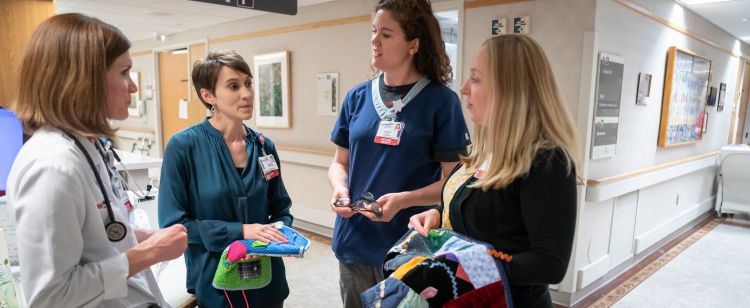Acute care for elders service expands, celebrates first anniversary at UW Health at The American Center

An older man living independently at home falls and fractures his hip. He’s brought to the hospital, and despite his injury, his medical records seem to indicate general good health. But an attending physician senses that something is off.
The physician calls the Acute Care for Elders (ACE) service and a “waterfall” of information about the patient’s home life emerges. Though technically living independently before his fall, he was just barely getting by. His family had begun to notice that he wasn’t leaving the house, eating well or talking much.
Upon further evaluation, the ACE team learned that the patient had missed his last two primary-care appointments, not taken any medications for the past two months and was found to have a moderate cognitive impairment. During the hospitalization, they adjusted his medications, monitored him closely for delirium, and established a safe discharge plan that included follow-up and management of his cognitive impairment.
This scenario is not uncommon. For some older patients, a hospitalization can be a sentinel event, uncovering care needs beyond the acute medical condition.
That’s where the Acute Care for Elders (ACE) consult service at UW Health comes in. Its interdisciplinary team offers an enhanced level of care that focuses on issues specific to the geriatric population: delirium, dementia and depression; functional status and mobility; polypharmacy; and transitions to home or other health-care settings.
In November 2019, the ACE service celebrates its first anniversary at UW Health at The American Center. (The service has also been available at University Hospital since 2006).
Offering the ACE service in two locations allows greater access for referring physicians, and increased support for older patients and their families as they navigate hospitalization.
Interdisciplinary team provides the ‘full picture’
The ACE team consists of geriatricians, advance practice providers, a clinical nurse specialist, a social worker, a pharmacist and a physical therapist.
The physician assistant is based at UW Health at The American Center; the rest of the team is based at University Hospital. Services are similar in both locations, with the exception of capacity assessments, which are only available at University Hospital.
At both locations, the cornerstone of the ACE service is the daily meeting, when the team reviews new and ongoing consults, shares recommendations, develops plans and carries out next steps.
![]() “The best thing about our team is that we can get the full picture,” says Elizabeth Chapman, MD, clinical assistant professor, Geriatrics, and medical director of the ACE service (pictured).
“The best thing about our team is that we can get the full picture,” says Elizabeth Chapman, MD, clinical assistant professor, Geriatrics, and medical director of the ACE service (pictured).
“We can have more of a prolonged conversation with the patient and family members about what they are noticing in the home that makes them worried, what is important to the patient while they’re in the hospital and whether we can mimic some of the things that the patient enjoys to make the hospital experience better,” she continues.
As part of its evaluations, the team often uncovers underlying cognitive issues that haven’t yet been diagnosed.
“Hospitalization is this critical moment when suddenly a loved one is under the microscope,” Dr. Chapman shares. “By asking questions about those things, families often feel relieved that someone is noticing and saying that it’s important.”
The ACE team also partners closely with the UW Health transitional care team on what happens after hospital discharge, whether it’s a stay in rehab, or a return to home with support from family or home-health providers.
Of the 707 patients referred to the ACE service between November 2018 and September 2019, 76 (11 percent) were at UW Health at The American Center. Pre-admission concerns, including dementia-related issues, functional decline, mobility, falls and geriatric medication review were the most common reasons for consults there, whereas delirium was the most common reason for an ACE consult at University Hospital.
A valuable resource across subspecialties
![]() Brian Williams, MD, clinical assistant professor, Hospital Medicine (pictured), is a frequent referrer to the ACE service in both locations.
Brian Williams, MD, clinical assistant professor, Hospital Medicine (pictured), is a frequent referrer to the ACE service in both locations.
He says that if an elderly hospitalized patient is demonstrating mental status changes—and it’s not clear whether that’s due to the illness itself, irregular sleep or other hospital environment factors, medication interactions or an underlying cognitive impairment—the ACE team’s 360-degree evaluations are extremely valuable.
“They do a deep dive on the cognitive aspect that sometimes I can’t do in the context of a really busy clinical day,” he says.
“It’s really nice to have their second opinion as far as the underlying diagnosis,” he continues. “They also do a great job on making recommendations on medication changes, improving day-to-day activities that can help improve delirium, and helping setup the transition out of the hospital.”
Dr. Williams and Dr. Chapman agree that the ACE service is a valuable resource for all physicians who care for elderly people, regardless of subspecialty.
“Even if a physician has the immediate medical issue under control, sometimes the patient needs the other pieces of care that we provide,” Dr. Chapman says.
“For a patient who is over 60 and is just not doing as well in the hospital as you’d expect, it’s always appropriate to think about our service,” she affirms. “We’re happy to see them.”
Banner: Members of the interdisciplinary Acute Care for Elders (ACE) service, pictured at University Hospital in June 2019, from left: Lauren Marshall, MS, PA-C; Stephanie Savoie, MSN, RN, AGCNS; Susanne Angileri, MPT; Magda Bertalan, MSW, CAPSW. In November 2019, the service celebrated the first anniversary of its expansion to UW Health at The American Center. Credit: Clint Thayer/Department of Medicine.